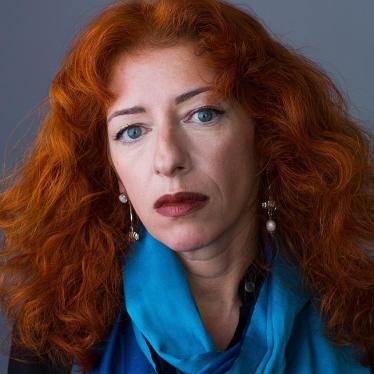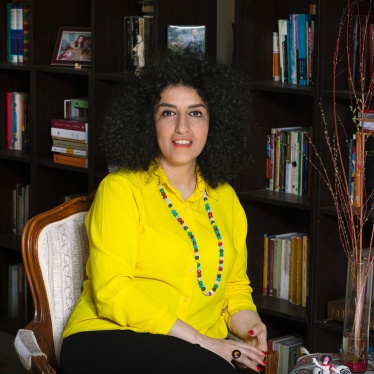(Moscow, August 2012) – Human Rights Watch has had an office in Russia for 20 years, almost as long as the contemporary Russian state has been in place. It’s certainly been a rollercoaster experience. In our early years, we were encouraged by the gains of fledgling Russian democracy; later on we documented the gradual setbacks and authoritarianism of the Putin era.
Today, once again, we see Russia at a crossroads, and with similar choices to the ones it faced twenty years ago.
In our series this week, we will present nine leading voices from Russian civil society and their visions of the most pressing human rights challenges in Russia. In general terms, they reflect the top priorities in the ongoing work of Human Rights Watch in Russia: the renewed crackdown on civil society, human rights violations in the turbulent North Caucasus, issues with implementation of judgments handed down by the European Court of Human Rights, LGBT rights, and the situation with palliative care.
We hope you enjoy the articles and look forward to receiving your feedback. For more information on Human Rights Watch work on Russia, visit: https://www.hrw.org/europecentral-asia/russia.
Anna Sevortian
Tanya Lokshina
28 August 2012
Russia's Police: New Name, But Can It Change Its Spots? by Asmik Novikova and Natalia Taubina
Reform of the Russian police, initiated in 2009 by then president Dmitry Medvedev, is still ongoing and mired in controversy. Asmik Novikova and Natalya Taubina of the ‘Public Verdict’ Foundation, a leading Russian NGO providing legal aid to victims of police torture and lawlessness, offer a progress report and specific recommendations.
27 August 2012
How God came to vote for Putin: the background to Pussy Riot by Sergei Lukashevsky
The gradual intrusion of the Orthodox Church into Russian secular life and the state is something that went largely unnoticed by the Russian public. According to Sergei Lukashevsky, head of the Sakharov Museum in Moscow, the Pussy Riot trial is beginning to change that.
24 August 2012
Strasbourg: Supreme Court of the North Caucasus by Grigor Avetisyan
For the population of Russia’s North Caucasus, crippled by war, violence and lawlessness, the European Court of Human Rights enjoys an almost mythical reputation. According to Grigor Avetisyan of Russia Justice Initiative, a leading human rights group helping victims of violations from the North Caucasus in their quest for justice, even those who win their cases in Strasbourg then face an impossible struggle for full implementation of the rulings.
23 August 2012
Palliative Сare in Russia: It's Time to Stop the Suffering by Anna Sonkin
In whatever country they manifest, life-limiting conditions are heartbreaking for children and their families. According to Anna Sonkin, MD, in Russia, a lack of resources and even more damaging disregard of children’s rights makes coping with the situation unnecessarily distressing.
Media Freedom in the Russian Regions? You Must Be Joking by Galina Arapova
As the Kremlin tightens its grip even further on the Russian media, lawyer and legal rights activist Galina Arapova looks at the tough options faced by journalists, especially in the regions.
22 August 2012
Pride, Prejudice — Just ‘Don’t Say Gay’ in Russia by Igor Kochetkov
LGBT issues have taken a battering in Russia over the last year, with a number of regions introducing repressive laws against the so-called ‘promotion’ of homosexuality. According to Igor Kochetkov of LGBT Network in St Petersburg, the changes are part of a wider agenda to split Russian society, whipping up feeling against people ‘not like us.
Government — The Main Source of Instability in the Northern Caucasus by Alexander Cherkasov
As violence in the north Caucasus hits the headlines again, Alexander Cherkasov of Memorial Human Rights Center sees the roots of the problem in the Russian government’s wilful misunderstanding of local issues and lack of strategy for dealing with them.
21 August 2012
Russian Government Declares ‘Cold War’ on Civil Society by Yuri Dzhibladze
The draconian laws introduced by President Putin during his first 100 days continue to inflame hearts and minds. According to Yuri Dzhibladze, a prominent Russian human rights advocate, some people have taken fright, but others are determined to carry on the fight.
The Nationalists and the Protest Movement by Alexander Verkhovsky
The Russian opposition movement is of necessity a broad coalition, with little to hold it together but a common hatred of the Putin regime. Alexander Verkhovsky of SOVA Center for Information and Analysis, looks at how its most controversial element, the nationalists, fit into the picture.










